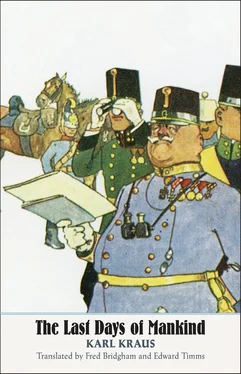Scene 21 (p. 449)
(War Ministry.)
Captain. Clerk. Officer cadet.
Scene 22 (p. 453)
(Provincial government in Brno.)
The governor. A clerk.
Scene 23 (p. 454)
(In a primary school.)
Teacher Zehetbauer.
The boys: Anderle, Gasselseder, Kotzlik, Merores, Sukfüll, Zitterer.
Scene 24 (p. 456)
(National Tourist Association.)
Reporter. Official.
Scene 25 (p. 457)
(Café on the Ring.)
Mammut. A waiter. Zieselmaus. Walross. Hamster. Nashorn. Tapir. Schakal. Leguan. Kaiman. Pavian. Kondor. Löw. Hirsch. Wolf. Posamentier. Spitzbauch. Schlechtigkeit. People rushing in. Gollerstepper. Tugendhat. Mastodon. Raubitschek. Vortrefflich. Gutwillig. Aufrichtig. Beständig. Brauchbar. Toilet attendant. Pollatschek. Lustig. Disabled war veteran. Bernhard Moldauer. Two of his friends. His wife. His daughter. The uncle. Young profiteer. Restaurant manager.
Scene 26 (p. 461)
(Berlin. Friedrichstrasse.)
Chorus of voices. A youth. A girl. Policeman. Berlin profiteer and Viennese profiteer, shoulder to shoulder. Newspaper vendor.
Scene 27 (p. 462)
(High Command garrison. A cabaret.)
Marionettes:
Drunken General Staff officer. Chorus of waiters. Girl on the right. Kohn. Fritzi-Spritzi. Proprietor. Toilet attendant and cloakroom staff. Fettköter. Girl on the left. General Staff officer. Other General Staff officers.
Scene 28 (p. 466)
(Viennese lecture hall.)
The Grumbler. A member of the audience and his wife.
Scene 29 (p. 468)
The Subscriber to the Neue Freie Presse and the Patriot.
Scene 30 (p. 468)
(Two Commercial Counsellors emerging from the Imperial Hotel.)
Two Commercial Counsellors. One-armed beggar woman. Cabby. Woman collapsing from hunger. Disabled war veteran.
Scene 31 (p. 470)
The Optimist and the Grumbler.
Scene 32 (p. 472)
(Reporting to battalion.)
A major. Four soldiers. Lance-corporal.
Scene 33 (p. 473)
The Optimist and the Grumbler.
Scene 34 (p. 476)
(In the Bohemian village Postabitz.)
A woman.
Scene 35 (p. 476)
(Hospital in Leitmeritz in northern Bohemia.)
Disabled prisoner of war on Red Cross exchange. His neighbour in the next bed.
Scene 36 (p. 476)
(Transit camp in Galicia for repatriated prisoners of war.)
The friend.
Scene 37 (p. 479)
(After the winter offensive in the Sette Communi on the Italian Front.)
Two war correspondents. Two soldiers. Captain. Plump figures emerging from motorcars. The Emperor, wrapped in heavy furs. Colonel. Major.
Scene 38 (p. 481)
(Hofburg Palace. Press office.)
Captain Werkmann. Clerk.
Scene 39 (p. 481)
(Kärntnerstrasse.)
Archduke Max. Lackey. The tenor. The crowd. Newspaper vendor.
Scene 40 (p. 482)
(A side street.)
A blind soldier and his little daughter. Disabled veteran with a hurdy-gurdy. Second-lieutenant.
Scene 41 (p. 482)
(Army High Command.)
A major. Another major.
Scene 42 (p. 483)
The Optimist and the Grumbler.
Scene 43 (p. 489)
(Vienna. Stadtpark.)
An enormous crowd. Newspaper vendors. Two ladies. Gentleman. Husband and his beloved spouse. Fat black-marketeer. His girl. A companion. Voice of a sceptic. Fräulein Körmendy. Fräulein Löwenstamm. A man about town and a snooty lady. Three speakers. Two groups. Someone who arrives panting. Elderly gentleman. Young man in belted coat. His friend. Steffi. Agitator. Representative of the film company. Restaurant proprietor.
Scene 44 (p. 492)
The Optimist and the Grumbler.
Scene 45 (p. 495)
(Innsbruck. Maria Theresienstrasse.)
Butcher’s boy. Girl with sabre. Officer without sabre. Two other officers. Two policemen. Military inspector.
Scene 46 (p. 496)
Two devotees of the Reichspost , asleep.
Scene 47 (p. 498)
(First-class compartment.)
Lieutenant-colonel Maderer von Mullatschak.
Scene 48 (p. 499)
(At 3,000 metres.)
Officer cadet. Alice Schalek.
Scene 49 (p. 499)
The Optimist and the Grumbler.
Scene 50 (p. 500)
(Swiss mountain railway.)
Gog & Magog. Trudchen.
Scene 51 (p. 505)
(A barracks in Siberia.)
Siberian prisoners of war. Austrian captain.
Scene 52 (p. 505)
(Vienna. Northern Railway Station.)
Wounded soldiers on a prisoner-of-war exchange. Various voices. Spielvogel and Zawadil. Eisner v. Eisenhof. Hofrat and Hofrätin Schwarz-Gelber. Wilhelm Exner. Dobner v. Dobenau. Riedl. Stukart. Sieghart. Landesberger. A mother. Her daughter. Dr. Charas. Flora Dub. Stiassny and Stiassny. Three Honorary Counsellors. Sukfüll. Birinski and Glücksmann. Hans Müller. Putzker. Hugo Heller. Newspaper editor.
Scene 53 (p. 508)
(A deserted street.)
Corybants and maenads.
Scene 54 (p. 508)
The Grumbler at his desk.
Scene 55 (p. 517)
(Ceremonial banquet at the headquarters of an army corps.)
Austrian general. Prussian colonel. Orderly. Major-general. Colonel. Lieutenant-colonel. Major. Captain of Horse. Duty officer. Telephone officer. Captains. Lieutenants. Second-lieutenants. Chief supply officer. Senior medical officer. Regimental doctor. Senior military prosecutor. Field chaplain and field rabbi. Artillery officer. Intelligence officer. Géza von Lakkati de Némesfalva et Kutjafelegfaluszég. Romuald Kurzbauer. Stanislaus von Zakrychiewicz. Petričič. Iwaschko. Koudjela. Baggage officer Felix Bellak. Wowes. German General Staff officer. German captain. Two Prussian captains. Two Prussian lieutenants. Prussian second-lieutenant. Two war correspondents. Sister Paula and Sister Ludmilla. Orderly. The band.
Act V Extras:
Rows of the wounded and the dead, playboys, beggars, members of the Upper House, rucksacks, knapsacks and bodies crammed in a tram, troops, participants in an enormous rally, passersby in Berlin’s Kaiserpassage, constituency election campaign members, German and French soldiers and officers, German prisoners of war, the wounded, coffeehouse customers, armadillos, girls in insectlike costume, waiters and waitresses, race-card vendors, a procession of ruffians, middlemen, operetta singers, bohemians, faith healers, ponces, rent-boys, prostitutes, swindlers, pimps, black-marketeers, street-walkers, General Staff officers, war profiteers, nightspot hostesses, audience at a lecture, promenaders, hospital patients, remnants of a regiment, travellers amidst their luggage, passengers on a Swiss mountain railway, members of the society Laurels for Our Heroes, officials, those serving refreshments to the wounded, journalists, Austrian and German officers, military supplies staff, apparitions.
Speaking apparitions:
The boy Lobodan Ljubinkovits (d. 1915); A war correspondent; The 19-year-old and the 21-year-old; Two military judges; A senior military judge; Captain Prasch; An Uhlan lieutenant; The gas masks; The soldiers who have frozen to death; The old Serbian peasant; The flames; The 1,200 horses; Leonardo da Vinci; The children from the Lusitania; The dogs of war; The dying forest; The mothers; The Austrian Face; The Ravens; Women auxiliaries; The unborn son.
Читать дальше












